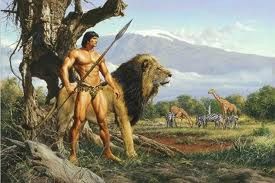What’s so special about this Tarzan?
Since Tarzan has become a myth, it was one of these characters I’ve always known all my life. As a child, I watched the cartoons and movies, but he never impassioned me as other characters could. Admittedly Burne Hogart’s drawings were impressive, the films with Johnny Weissmuller entertaining, but Tarzan himself appeared terribly insipid to me. Even Superman, which also had a boy-scout reputation, seemed more interesting with his hidden identity and his adventures worthy of the most outrageous science fiction. But the adventures in the jungle, yawn. All that didn’t seem very imaginative.
Also, even when I fell in love with the Mars (Barsoom) universe in the Eighties, I didn’t try to read Tarzan, of whom I believed I knew everything of interest, and who at that stage even bored me.
It was thus only very recently that I tried to read the first novel, just to see what the big deal was. And all of a sudden I understood. What a shock! There was a whole universe, and a character, that the successive adaptations during the last hundred years had barely touched!
First of all I discovered, in great detail, the tragedy of Lord Greystoke and Lady Alice, which was touching and poignant. There was in this story alone all the elements of an extraordinary movie, which would have allowed to understand where all the qualities displayed in Tarzan came from (because in Burroughs’ world, qualities, like defects, are hereditary). With that, in parallel, the story of Kala, of the Mangani tribe, missing link between ape and man, future adoptive mother of Tarzan.
Then, there’s Tarzan himself. Far from being the Lord of the Jungle either civilized and insipid, or stupid and animal enough to eat hay, a character much more complex was taking shape. Some accused Burroughs of racism and imperialism (Tarzan the white man superior to the black men, of which some are depicted like cannibals). With the reading of the text, I had to realize the error of these easy criticisms: on one hand, the existence of black cannibal tribes is not an invention of Burroughs which, if he never put one foot in Africa, documented himself on the subject. In addition, the black tribe of the Waziri is presented as particularly noble. And finally, Tarzan isn’t only superior to black men, he is superior to ALL men, whatever their skin color. Let’s also point out that the noblest ethnicity on Barsoom is the Black Pirates of the sea of Korus.
Tarzan is an animal first, and asserts himself as such, and a man second. His dietary habits would seem repellant to us (because he eats raw meat, which makes him, as it’s expressly written in one of the novels, even less civilized than the members of the black tribes who cook their food), and his sense of humor is strongly tainted with cruelty, and even straightforwardly immoral (in Tarzan the Untamed in particular). In short, nothing in relation to the clean image which would prevail later on. I was surprised to discover in Tarzan a character ultimately closer to a Wolverine than to a Superman…
I can only advise you to read the novels to make an opinion, while they are available. In France, with Burroughs, one never knows for how long that will be the case.




/http%3A%2F%2Fstorage.canalblog.com%2F00%2F80%2F1145416%2F128919088_o.jpg)
/http%3A%2F%2Fstorage.canalblog.com%2F54%2F33%2F1145416%2F128892836_o.jpg)
/http%3A%2F%2Fstorage.canalblog.com%2F94%2F37%2F1145416%2F126206950_o.jpg)
/http%3A%2F%2Fstorage.canalblog.com%2F19%2F98%2F1145416%2F122814086_o.png)